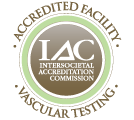PAD – Peripheral Artery Disease
According to the American Heart Association, peripheral artery disease (also known as peripheral arterial disease or PAD) affects more than 8.5 million Americans. It also becomes more common as we get older. PAD is considered to be dangerous because it restricts circulation in your arteries, organs and legs. While it is true that PAD is a life-threatening condition, it can be managed with proper care and treatment.
What is Peripheral Arterial Disease or PAD?
PAD is a condition where your peripheral arteries to the legs (most commonly affected by this condition), stomach, arms, and head will start becoming narrow. This can cause major damage and lead to other health problems. The good news is that PAD is easily diagnosed and can be managed with the right medication and lifestyle changes.
Who is at Risk for PAD?
Peripheral artery disease is often caused by atherosclerosis, a condition in which fatty deposits (plaque) build up in your artery walls and reduce blood flow. When the plaque affects arteries supplying blood to your limbs, it causes peripheral artery disease. Inflammation of blood vessels, limb injuries, unusual ligament or muscle structure, or radiation exposure can also cause PAD, though they are less common causes.
Here are certain factors that can increase your risk for developing peripheral artery disease:
- Smoking
- Diabetes
- Obesity
- High blood pressure
- High cholesterol
- Increasing age, especially after 50
- A family history of PAD, stroke or heart disease
- High levels of homocysteine, a protein component that helps build and maintain tissue
While some of these causes cannot be controlled, many of them can. By working towards controlling lifestyle factors, you can help reduce your risk for PAD. It is also a good idea to get screened for PAD if you have multiple risk factors.
PAD Symptoms
Many individuals with peripheral arterial disease may have no symptoms at all. That is why it is important to be vigilant and look out for any indication that you might have this condition. By going in to be screened for PAD, you will know whether or not you have anything to be concerned about.
Some common signs of PAD are:
- Painful cramps in your hip, thigh or calf muscles after walking or climbing stairs
- Numbness or weakness in your leg(s)
- Coldness in your lower leg or foot, usually in one leg or foot rather than both
- Wounds on your foot or toe that don’t heal, take a long time to do so
- Any change in leg color
- Hair loss as well as slow hair growth on your legs and feet
- Slower growth of toenails
- Shiny skin on your legs
- No pulse (or a weak pulse) in your legs or feet
- Erectile dysfunction in men
Getting Treated for PAD
PAD diagnosis typically begins with a physical exam, yet there are some cases where it can be missed. If you have any of the risk factors or symptoms, you should be screened for PAD at ages 50 and 70. There are many different types of non-invasive screening procedures such as Doppler and Ultrasound (Duplex) imaging, Computed Tomographic Angiography (CTA) and Magnetic Resonance Angiography (MRA). You may be asked to do an angiography if you are having other vascular treatment procedures.
Don’t neglect PAD, as it can result in severe pain and worse still, the loss of your leg. It can also increase your risk of a heart attack or stroke.
Take advantage of the latest facilities for PAD screening and care at The Vascular Experts. We help manage your condition and improve your quality of life. You will undergo a thorough assessment for accurate diagnosis. Based on the results, you will be treated by a trained and board-certified vascular surgeon on our team. Many of the tests are also carried out on our premises for your convenience and comfort.
You can count on our team to provide you with the best vascular care and patient experience. Our expertise and dedication has resulted in The Vascular Experts becoming one of the largest groups of board-certified vascular surgeons in the country.



